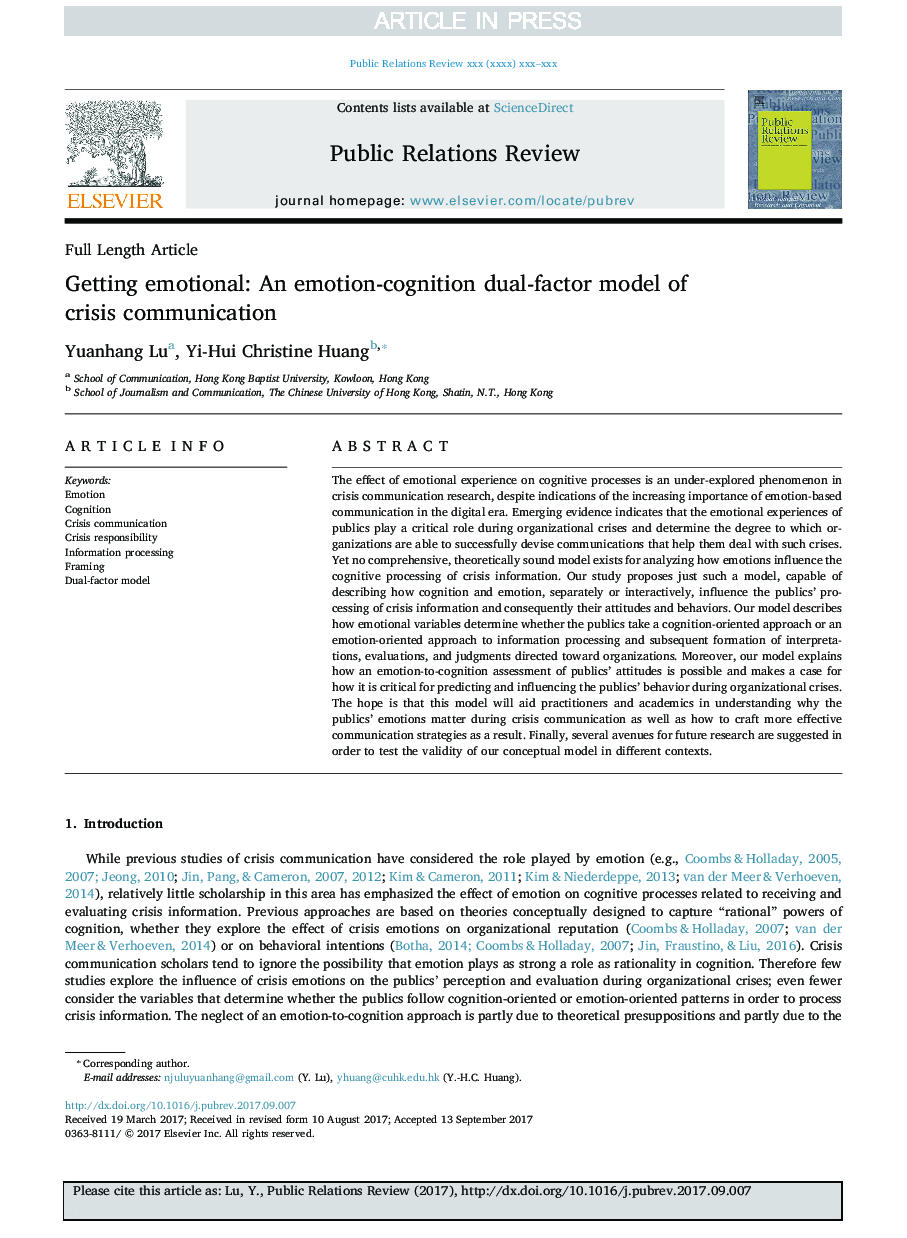| کد مقاله | کد نشریه | سال انتشار | مقاله انگلیسی | نسخه تمام متن |
|---|---|---|---|---|
| 6575870 | 1422776 | 2018 | 10 صفحه PDF | دانلود رایگان |
عنوان انگلیسی مقاله ISI
Getting emotional: An emotion-cognition dual-factor model of crisis communication
ترجمه فارسی عنوان
احساس عاطفی: مدل شناختی عاطفی دو عامل ارتباطات بحران
دانلود مقاله + سفارش ترجمه
دانلود مقاله ISI انگلیسی
رایگان برای ایرانیان
کلمات کلیدی
هیجانی، شناخت، ارتباطات بحران، مسئولیت بحران، پردازش اطلاعات، کادر بندی، مدل دو عامل،
ترجمه چکیده
تأثیر تجربه عاطفی در فرآیندهای شناختی، پدیده ای که کمتر مورد بررسی قرار گرفته در تحقیقات ارتباطات بحران، با وجود نشانه های اهمیت فزاینده ارتباطات مبتنی بر احساسات در دوران دیجیتالی است. شواهد جدید نشان می دهد که تجربیات عاطفی عموم مردم در حین بحران های سازمانی نقش مهمی ایفا می کنند و درجه ای را که سازمان ها قادر به برقراری ارتباط موفق هستند و به آنها کمک می کند تا با چنین بحران هایی مقابله کنند، تعیین می کند. با این حال هیچ جامع، نظریی برای مدل صدا برای تحلیل اینکه چگونه احساسات بر پردازش شناختی اطلاعات بحران تاثیر می گذارد، وجود دارد. مطالعه ما فقط یک چنین مدل ارائه می دهد که قادر است توضیح دهد که چگونه شناخت و احساسات، به طور جداگانه یا تعاملی، بر پردازش اطلاعات عمومی بحران و در نتیجه نگرش و رفتار آنها تاثیر می گذارد. مدل ما توصیف می کند که چگونه متغیرهای احساسی تعیین می کنند که آیا عموم مردم رویکرد شناختی یا رویکرد احساسات را به پردازش اطلاعات و شکل گیری تفسیر، ارزیابی ها و قضاوت هایی که به سازمان ها هدایت می شود، می گیرند. علاوه بر این، مدل ما توضیح می دهد که چگونه یک ارزیابی احساسی نسبت به شناخت نگرش های عمومی امکان پذیر است و می تواند دلیل آن برای پیش بینی و تأثیر رفتار عمومی مردم در بحران های سازمانی باشد. امید است که این مدل به تمرینکنندگان و دانشگاهیان کمک کند تا درک کنند که چرا احساسات عمومی در طول ارتباطات بحرانی و همچنین نحوه ایجاد استراتژیهای ارتباطی موثرتر به عنوان یک نتیجه مهم است. در نهایت، برای اثبات اعتبار مدل مفهومی ما در زمینه های مختلف، چندین راه برای تحقیقات آینده پیشنهاد شده است.
موضوعات مرتبط
علوم انسانی و اجتماعی
مدیریت، کسب و کار و حسابداری
بازاریابی و مدیریت بازار
چکیده انگلیسی
The effect of emotional experience on cognitive processes is an under-explored phenomenon in crisis communication research, despite indications of the increasing importance of emotion-based communication in the digital era. Emerging evidence indicates that the emotional experiences of publics play a critical role during organizational crises and determine the degree to which organizations are able to successfully devise communications that help them deal with such crises. Yet no comprehensive, theoretically sound model exists for analyzing how emotions influence the cognitive processing of crisis information. Our study proposes just such a model, capable of describing how cognition and emotion, separately or interactively, influence the publics' processing of crisis information and consequently their attitudes and behaviors. Our model describes how emotional variables determine whether the publics take a cognition-oriented approach or an emotion-oriented approach to information processing and subsequent formation of interpretations, evaluations, and judgments directed toward organizations. Moreover, our model explains how an emotion-to-cognition assessment of publics' attitudes is possible and makes a case for how it is critical for predicting and influencing the publics' behavior during organizational crises. The hope is that this model will aid practitioners and academics in understanding why the publics' emotions matter during crisis communication as well as how to craft more effective communication strategies as a result. Finally, several avenues for future research are suggested in order to test the validity of our conceptual model in different contexts.
ناشر
Database: Elsevier - ScienceDirect (ساینس دایرکت)
Journal: Public Relations Review - Volume 44, Issue 1, March 2018, Pages 98-107
Journal: Public Relations Review - Volume 44, Issue 1, March 2018, Pages 98-107
نویسندگان
Yuanhang Lu, Yi-Hui Christine Huang,
